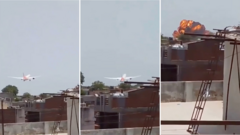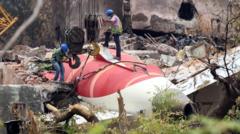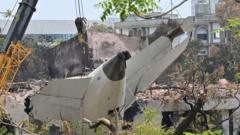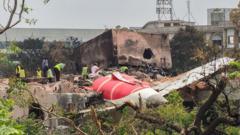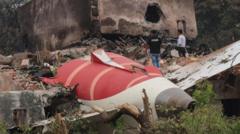The incident that claimed numerous lives has prompted an investigation into the management of the construction project.
Thailand Arrests Chinese Executive Linked to Bangkok Earthquake Collapse

Thailand Arrests Chinese Executive Linked to Bangkok Earthquake Collapse
A significant arrest raises concerns over construction practices after a deadly building collapse in Thailand following an earthquake.
Authorities in Thailand have taken swift action following a devastating building collapse in Bangkok caused by an earthquake last month, resulting in numerous fatalities. A Chinese national, identified only by his last name Zhang, was arrested in connection with the state-owned company involved in the construction of the building.
The Thai police captured Zhang Chuanling, an executive at China Railway 10th (Thailand), on Saturday after warrants were issued for him and three other board members. The local media reports indicate these men are accused of breaching the Foreign Business Act, which limits foreign ownership in Thai businesses to less than 50 percent. Allegations have surfaced that they utilized Thai nationals as fronts to circumvent this law.
Popular pressure is mounting on Thai Prime Minister Paetongtarn Shinawatra to address this tragic incident, which saw the 30-story building, intended to become the headquarters for the National State Audit Office, collapse. Calls for a thorough investigation into all projects involving China Railway 10th are growing, especially after it was claimed that the firm removed vital documents from the construction site in the aftermath of the tragedy.
The earthquake's origin, coming from over 600 miles away in Myanmar, shocked many and raised questions about safety standards. Currently, the death toll in Thailand stands at 47, with another 47 presumed dead. The overwhelming majority of casualties were from the building collapse.
The project was a joint venture between China Railway 10th and a Thai firm, Italian-Thai Development, but workers have reported that the day-to-day operations fell under the Chinese company's control. Workers alleged that underpayment led to the use of inferior materials and scaled-down safety measures, including the use of narrow columns in the structure.
Investigations by Thai authorities into the materials used have revealed substandard steel bars, linked to a factory associated with Chinese ownership, which had been shut down by the government in December for poor practices. An anti-corruption group has also identified construction irregularities that require further examination.
As the investigation unfolds, Zhang’s role as a significant shareholder in China Railway 10th (Thailand) has come to light, although attempts to contact him or procure legal representation have been unsuccessful. The broader implications of this incident will likely resonate throughout Thailand as scrutiny on foreign involvement in local businesses intensifies.
The Thai police captured Zhang Chuanling, an executive at China Railway 10th (Thailand), on Saturday after warrants were issued for him and three other board members. The local media reports indicate these men are accused of breaching the Foreign Business Act, which limits foreign ownership in Thai businesses to less than 50 percent. Allegations have surfaced that they utilized Thai nationals as fronts to circumvent this law.
Popular pressure is mounting on Thai Prime Minister Paetongtarn Shinawatra to address this tragic incident, which saw the 30-story building, intended to become the headquarters for the National State Audit Office, collapse. Calls for a thorough investigation into all projects involving China Railway 10th are growing, especially after it was claimed that the firm removed vital documents from the construction site in the aftermath of the tragedy.
The earthquake's origin, coming from over 600 miles away in Myanmar, shocked many and raised questions about safety standards. Currently, the death toll in Thailand stands at 47, with another 47 presumed dead. The overwhelming majority of casualties were from the building collapse.
The project was a joint venture between China Railway 10th and a Thai firm, Italian-Thai Development, but workers have reported that the day-to-day operations fell under the Chinese company's control. Workers alleged that underpayment led to the use of inferior materials and scaled-down safety measures, including the use of narrow columns in the structure.
Investigations by Thai authorities into the materials used have revealed substandard steel bars, linked to a factory associated with Chinese ownership, which had been shut down by the government in December for poor practices. An anti-corruption group has also identified construction irregularities that require further examination.
As the investigation unfolds, Zhang’s role as a significant shareholder in China Railway 10th (Thailand) has come to light, although attempts to contact him or procure legal representation have been unsuccessful. The broader implications of this incident will likely resonate throughout Thailand as scrutiny on foreign involvement in local businesses intensifies.



